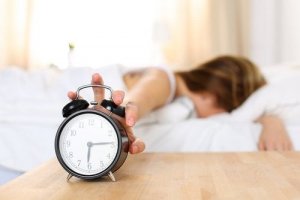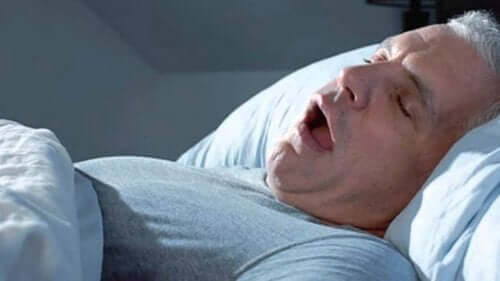Reasons Why You Wake up Tired

If you wake up tired even if you slept many hours, you’re probably wondering if something is wrong. Many things can cause this unpleasant situation. The most striking fact is that, often, this isn’t due to insomnia. On the surface, it seems you’ve had enough hours of deep sleep. Nevertheless, you still wake up feeling tired and this happens to you often, without knowing why. Often, it doesn’t even matter if you get up at noon. In the end, the same thing happens: you wake up tired, with a sluggish mind and in a very bad mood.
Why do you wake up tired? Why isn’t sleeping more enough to make this go away?
Discover the answers below.
Do you wake up tired?
The first thing you should know is that the body sleeps in cycles. Although human beings are very adaptable, in the end, the body and mind work better if you live a life with stable patterns. This decisively affects fatigue.
If, for example, you get up every day at 7 a.m. and go to bed before 9 p.m. but you change that pattern during the weekends, your body will get confused. In those cases, you may wake up tired, regardless of how many hours you slept. Typically, humans have five 90-minute sleep cycles per night. Each cycle, in turn, is divided into four stages. The point is that, if you change your hours of rest, you may wake up at the wrong time, before completing the entire process.
What’s the result?
You wake up tired.
You should also read: Sleeping Well: 6 Habits to Get Enough Rest
Sleep disorders

Sometimes, the most obvious reason why someone wakes up tired is sleep disorders. If you frequently have difficulty falling asleep or wake up several times a night, you’ll probably feel tired when you get out of bed and throughout the day. One disorder that affects sleep quality is sleep apnea. This is a condition whereby a person makes breathing pauses while they’re sleeping. The direct effect of this is that, when they wake up, they feel as if they hadn’t slept.
The consumption of certain substances
The consumption of certain substances, such as alcohol, is a major obstacle to getting a good night’s sleep. It has a paradoxical effect: although it causes sleepiness at the beginning, it finally doesn’t allow you to sleep soundly. Something very similar happens with certain drugs, especially sedatives.
Coffee is another enemy of a good night’s sleep. Drinking a cup of coffee in the morning makes you feel more awake. However, if you drink it at night, you probably won’t be able to get a good night’s sleep. You should make sure not to drink coffee less than five hours before bed.
This article may interest you: Tips to Avoid Sleep Disorders in Teens
Psychological problems
Sometimes, the reason you wake up tired is the way human minds work. Before falling asleep, many people review all of their worries or the decisions they have to make. This is the worst time to do so. It generates “nocturnal anxiety” and affects rest. Stress generally prevents you from getting a peaceful sleep. This discomfort causes you to remain alert, even when you’re sleeping. Thus, you wake up easily and can’t sleep soundly. In these cases, the best idea is to learn relaxation techniques.

Other reasons why you wake up tired
Also, it’s very common for you to feel tired when you wake up if you don’t have good sleep hygiene. A lot of light, noise, or high temperatures, for example, prevent peaceful rest. This is also related to bad daily habits. Several studies have demonstrated that looking at screens before bedtime doesn’t favor rest. Nor is it a good idea to eat large meals, especially if they contain a lot of sugar. Not exercising during the day also affects good sleep.
On the other hand, gut microbiota problems tend to be reflected in bad quality sleep. This affects the production of hormones and neurotransmitters which are necessary to relax and rest peacefully. If you don’t have a healthy microbiota, it won’t be easy for you to sleep soundly.
All of these factors play a role in the quality of your sleep and may be the reason why you’re still waking up tored.
All cited sources were thoroughly reviewed by our team to ensure their quality, reliability, currency, and validity. The bibliography of this article was considered reliable and of academic or scientific accuracy.
- Ferré, A. (2018). Síndrome de fatiga crónica y los trastornos del sueño: relaciones clínicas y dificultades diagnósticas. Neurología, 33(6), 385-394.
- Marín Agudelo, H. A. (2008). Trastornos del sueño, salud y calidad de vida Una perspectiva desde la medicina comportamental del sueño. Suma Psicologica. https://doi.org/10.14349/sumapsi2008.24
- Borquez, P. (2011). Calidad del sueño, somnolencia diurna y salud autopercibida en estudiantes universitarios. Eureka.
This text is provided for informational purposes only and does not replace consultation with a professional. If in doubt, consult your specialist.








